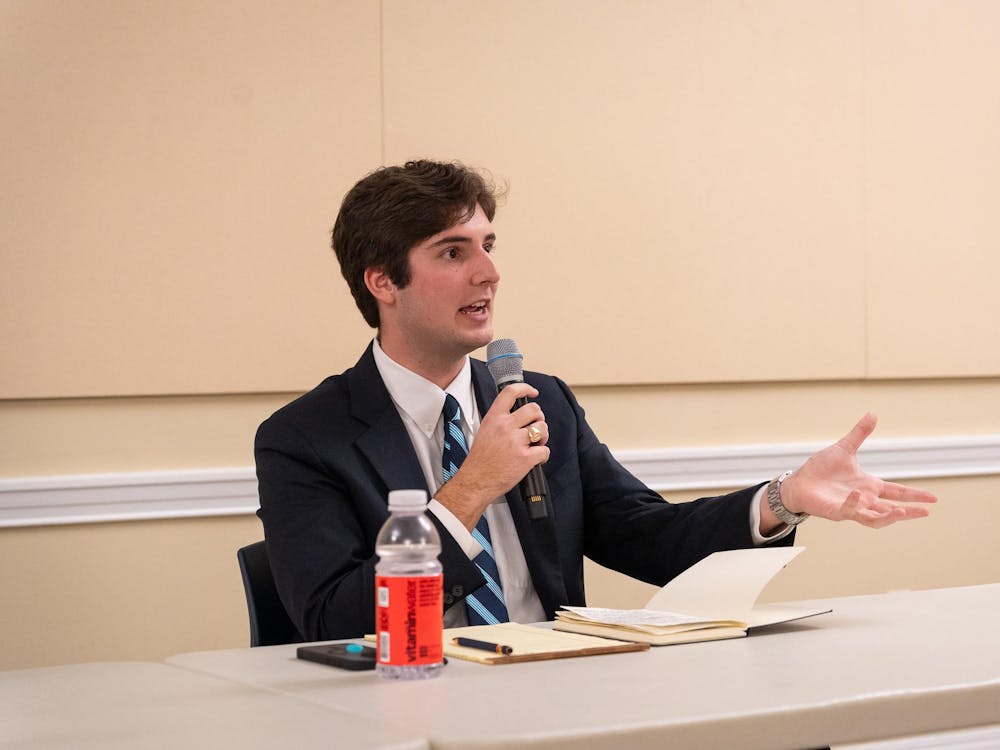The Faculty Senate recently voted unanimously to support the principle of creating a new rank called the professor of practice, which will allow schools to hire distinguished professionals for short-term, non-tenure-track teaching positions.
"This rank will allow us to attract accomplished professionals whose qualifications, while outstanding, do not conform to those of a member of the tenured faculty," according to materials drawn up by the Office of the Executive Vice President & Provost for Faculty Senate review.
The proposal calls for no more than five professors of practice to be chosen at a time for any given school. The proposal is for one-year appointments with annual reappointments possible for a total of up to three years in most cases, with a fourth and final year possible for some individuals, said John Teahan, assistant to the vice provost for administration and chief of staff. Any school would be able to hire a professor of practice under these guidelines.
The policy is "only about creating a new kind of professorial rank, not about changing new positions or existing ranks in any way," Faculty Senate Chair Ann Hamric said, adding that the creation of the new rank would have no budgetary implications.
If the department chair and corresponding dean should agree to hire a professor of practice, the person would be brought in under this rank to an existing faculty line.
The idea for the rank program originated in summer 2009, Teahan said.
Batten School Dean Harry Harding said he saw the professor practitioner rank role in action during his time as Dean of the Elliott School of International Affairs at George Washington University and described it as "a very positive experience" for the individuals involved.
"Having representatives of the profession that students are training to enter can only be beneficial to a school," Harding said.
Teahan said 22 schools among the Association of American Universities, which the University usually regards as its peer group, have this rank program. This group includes both public and private institutions such as Duke University, Harvard University, the Massachusetts Institute of Technology, the University of Maryland and the University of North Carolina, Chapel Hill.
Harding said students at the Elliot School wanted faculty members with recent experience outside of academics to provide them with perspectives and firsthand experience in the field and teach them skills that would be important to careers in a wide array of organizations.
"Very few students in a professional school are planning academic careers," Harding said.
As a result, relatively few professors have had pre-professional backgrounds.
It is important to have professors who can teach pure analytical skills, Harding said, but having professors of practice "adds another dimension to the academic program of a professional school."\nDrama Department Chair Tom Bloom said he saw positive implications for the proposed new rank.
"Drama engages many nationally and internationally renowned artists and would welcome additional opportunities for our students to engage with distinguished artists in the classroom or in production," Bloom stated in an e-mail.
Politics Department Chair Jeffrey Legro said giving students more opportunities to interact with professionals would make it easier for them to make connections outside of school, as well.\nAt the same time, Legro said there would be some difficulties introduced by the hiring of professors with non-academic backgrounds.
"You have a faculty line eaten up by somebody who really can't supervise [individuals holding] Ph.D.s and M.A.s - that's just not what they do, and they don't understand that world," Legro said.\nMoreover, such professors would not be able to sit on committees for reviews, admissions or searches for new faculty members and administrators, he said.
Ricky Patterson, senior scientist in the astronomy department and former chair of the General Faculty Council, said some individuals present at Faculty Senate policy committee discussions were concerned support structures surrounding such professors would be improperly constructed.
"Our concerns, as well as some others of the Faculty Senate, were about guarantees for grievance procedures just to make sure that a person [of this rank] can't be taken advantage of," Patterson said.\nAlthough the General Faculty Council has participated in conversations about the creation of the new professor rank, it has not yet taken an official stand on the policy the Faculty Senate discussed, Patterson said.
"It looks like the situation is resolving itself amicably," Patterson said. "The concerns of the Faculty Senate policy committee are being resolved, and those include the protections for an individual in the professor of practice rank for grievance procedures."
The Faculty Senate currently is reviewing how to turn the proposal into an official policy. The Board of Visitors is set to review any proposed policy during its June meeting, at which point that policy could obtain final approval, Teahan said.
Once the overall policy is approved and finalized, schools should be able to appoint professors of practice immediately, Teahan said.






